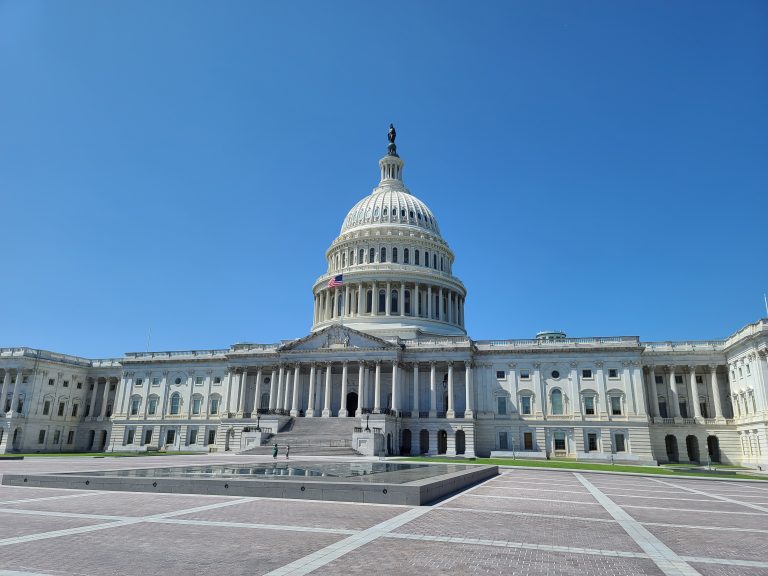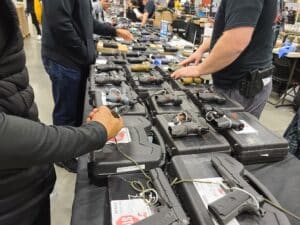“Red flag” laws, expanded background checks, and “hardening” schools.
Amidst the public outcry following the attack on Robb Elementary School in Uvalde, Texas, a consensus seems to have formed around exploring proposals along these lines with new legislation.
A bipartisan group of senators—Chris Murphy (D., Conn.), Joe Manchin (D., W.Va.), Kyrsten Sinema (D., Ariz.), Martin Heinrich (D., N.M.), Richard Blumenthal (D., Conn.), Susan Collins (R., Maine), Pat Toomey (R., Pa.), Lindsey Graham (R., S.C.), and Bill Cassidy (R., La.)—met on Thursday to collaborate on versions of these proposals that might survive the evenly divided Senate.
Here’s a look at how these proposals appear to be shaping out.
Red Flag Bills
Red flag policies have reportedly drawn the most common ground during the discussions. Generally, they allow judges to issue special restraining orders that temporarily bar those found to be a threat to themselves or others from buying guns and require them to turn over any they already own.
Critics have pointed out that a federal red flag law would be unwieldy. The concern is that federal courts are not as well equipped as state and local courts to handle the volume of immediate-action hearings required by red-flag orders.
A more likely path would be for Congress to pass model red flag legislation, along with grant programs or other funding incentives for states to adopt the policy voluntarily. Preference for a state-driven approach has already been echoed by several Senate Republicans who have expressed interest in backing the temporary gun seizures.
19 states plus the District of Columbia already have versions of red flag legislation on the books. A concerted effort among states without red flag laws to join the others seems like a distinct possibility, with or without Congressional action.
Despite already having a version of the legislation on its books before the Buffalo Massacre, New York Governor Kathy Hochul (D.) has recently taken steps to expand its red flag law via executive order. She now wants to require police officers to request a red flag order anytime they have reasonable suspicion one is needed.
Even in Texas, despite Governor Greg Abbott’s recent rejection of calls for new gun laws, a push for some form of risk protection legislation is at least feasible. Fellow red-state Florida enacted the policy, becoming only the second red state to do so, following the Parkland shooting back in 2018. That same year, Governor Abbott expressed interest in having the Texas legislature explore the policy as part of his report on recommendations for school safety.
However, deeply held civil liberties concerns among many gun-rights advocates still present a significant obstacle to widespread take-up among red states. The use of ex parte orders, where the defendant is not provided an opportunity to dispute the order before it’s issued, and the low standard of evidence some states require remains a sticking point for many. Those concerns could deter Texas from pursuing the policy any further.
Background Checks
In March of last year, the House of Representatives passed a bill requiring background checks on all private gun transfers with limited exceptions and an extension of the time the FBI can delay a gun purchase before finalizing a background check. The bills have seen no movement in the Senate since then, but Majority leader Chuck Schumer (D., N.Y.) moved to fast track them for consideration on Wednesday. Neither bill is not expected to pass, though, with objections from even some Democrats.
Talk of reviving the 2013 Manchin-Toomey background check bill, which would have expanded background checks to include private sales but not all transfers, also appears to be taking place at the federal level. Senators Manchin, Toomey, and Mitt Romney (R., Utah) have all expressed openness to the idea thus far.
However, supporters of the move appear to be less sanguine about the prospects of it surviving a 60-vote threshold in the Senate. Senator Toomey told The Washington Post that it currently doesn’t have enough support in the Senate to pass.
The original version of the bill fell six votes short back in 2013. Despite helping to lead the charge for new gun laws in response to the attacks in Buffalo and Uvalde, Manchin has maintained that he will not sway from his support for keeping the filibuster in place. Unless eight more Republicans decide to join the effort to revive Manchin-Toomey, expanded background checks are unlikely to pass before the midterms.
School Security Measures
Several elected officials, primarily Republicans, have proposed reforms meant to “harden” or improve security at schools to defend against future attacks.
Senators Cynthia Lummis (R., Wyo.), Mike Rounds (R., S.D.), and Kevin Cramer (R., N.D.) have all called for the direction of COVID money or other federal funds to local school districts to improve police response times. Senator Murphy told The Washington Post that he was open to discussions within the bipartisan Senate group over increased funding for school security. But Democratic Senate leadership has largely thrown cold water on the idea preferring to focus on gun-control measures instead.
At the state level, Republicans in Texas have also emphasized the need to improve school security, drawing on a law passed by the state in 2019. That law instituted new emergency response plans for Texas schools, set training requirements for school resource officers, and established threat assessment protocols for identifying potentially dangerous students, among other reforms.
“We consider what we did in 2019 to be one of the most profound legislative sessions not just in Texas but in any state to address school shootings,” Governor Abbott said at a press briefing in Uvalde Wednesday. “But to be clear, we understand our work is not done. Our work must continue.”
No formal proposals have been advanced. However, given the state’s current political composition, it’s highly likely that additional GOP-backed school security measures will be advanced and implemented in the state soon.
The Likely Outcome
There is significant pressure on politicians at all levels to come up with new laws to prevent future massacres like the one at Robb Elementary School and Tops Grocery Store. That very well could lead to a breakthrough in Congress on some kind of legislation whether it’s in the form of a single policy or a major compromise bill made up of several policies favored by each side.
However, the state level remains the most likely to see proposals actually make it into law. And it’s likely that, as with current gun laws, they will significantly diverge from one another. New York will probably institute new gun restrictions while Texas focuses on hardening schools. Other states may follow suit along the same lines as well.






